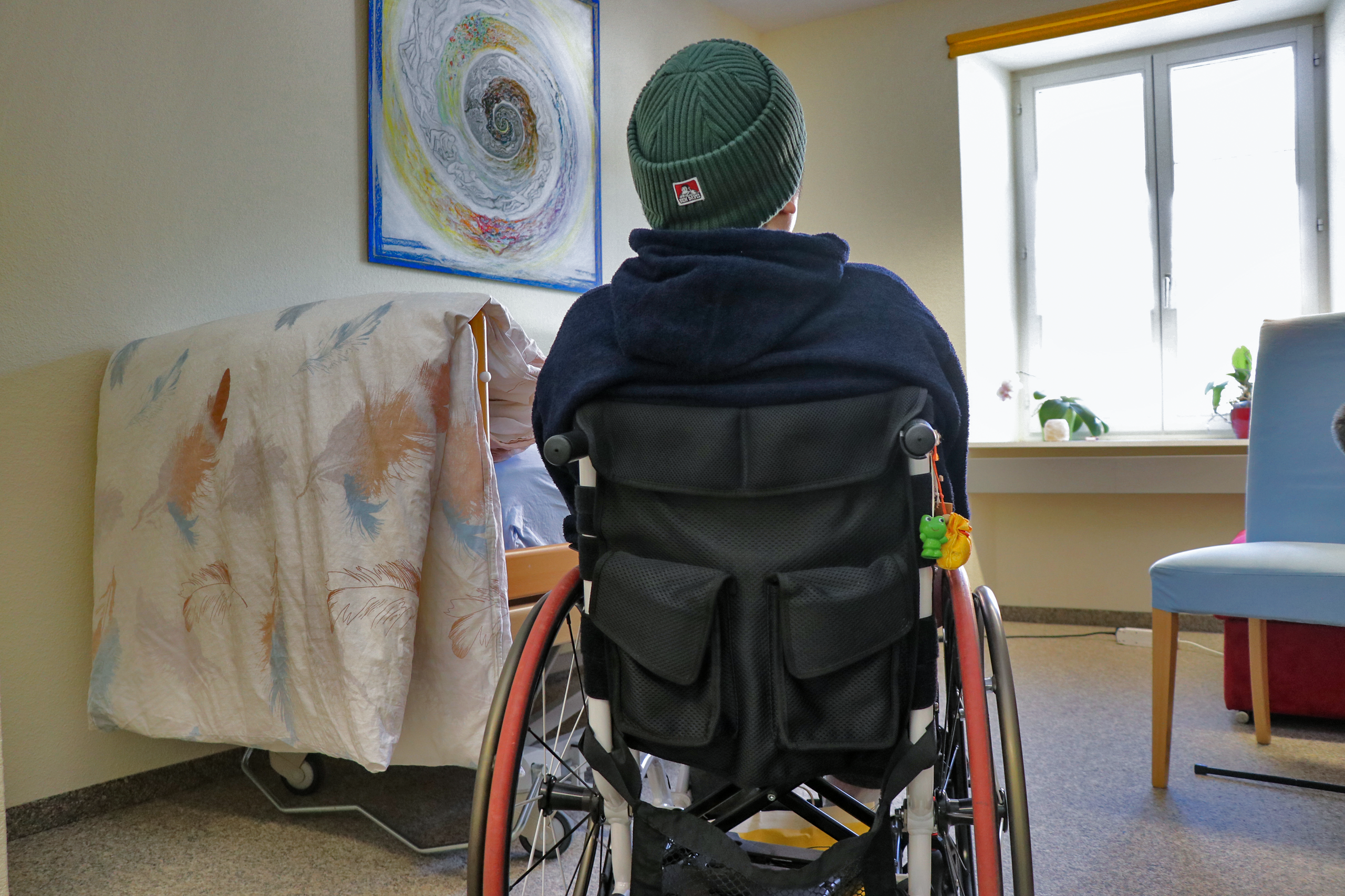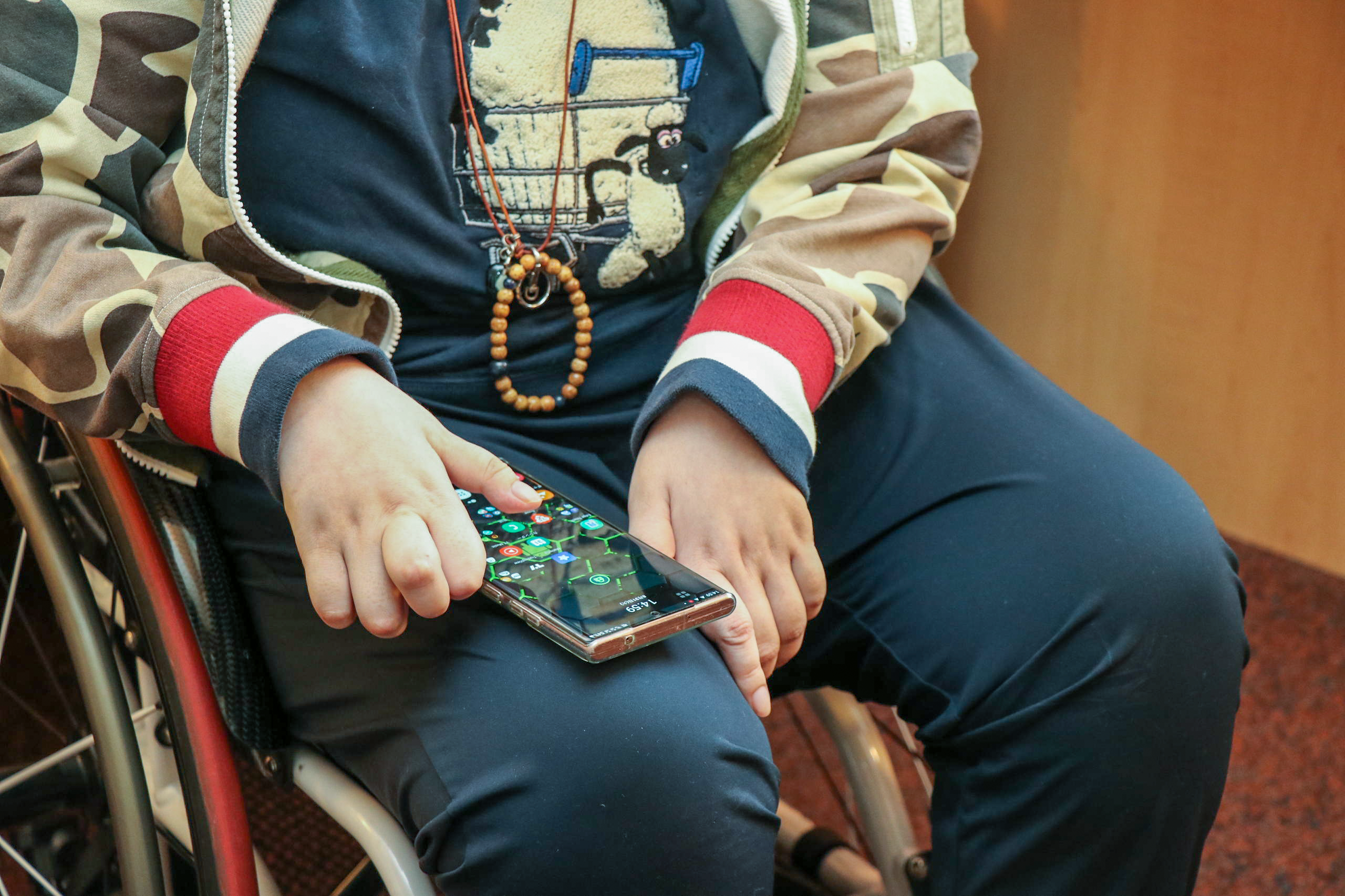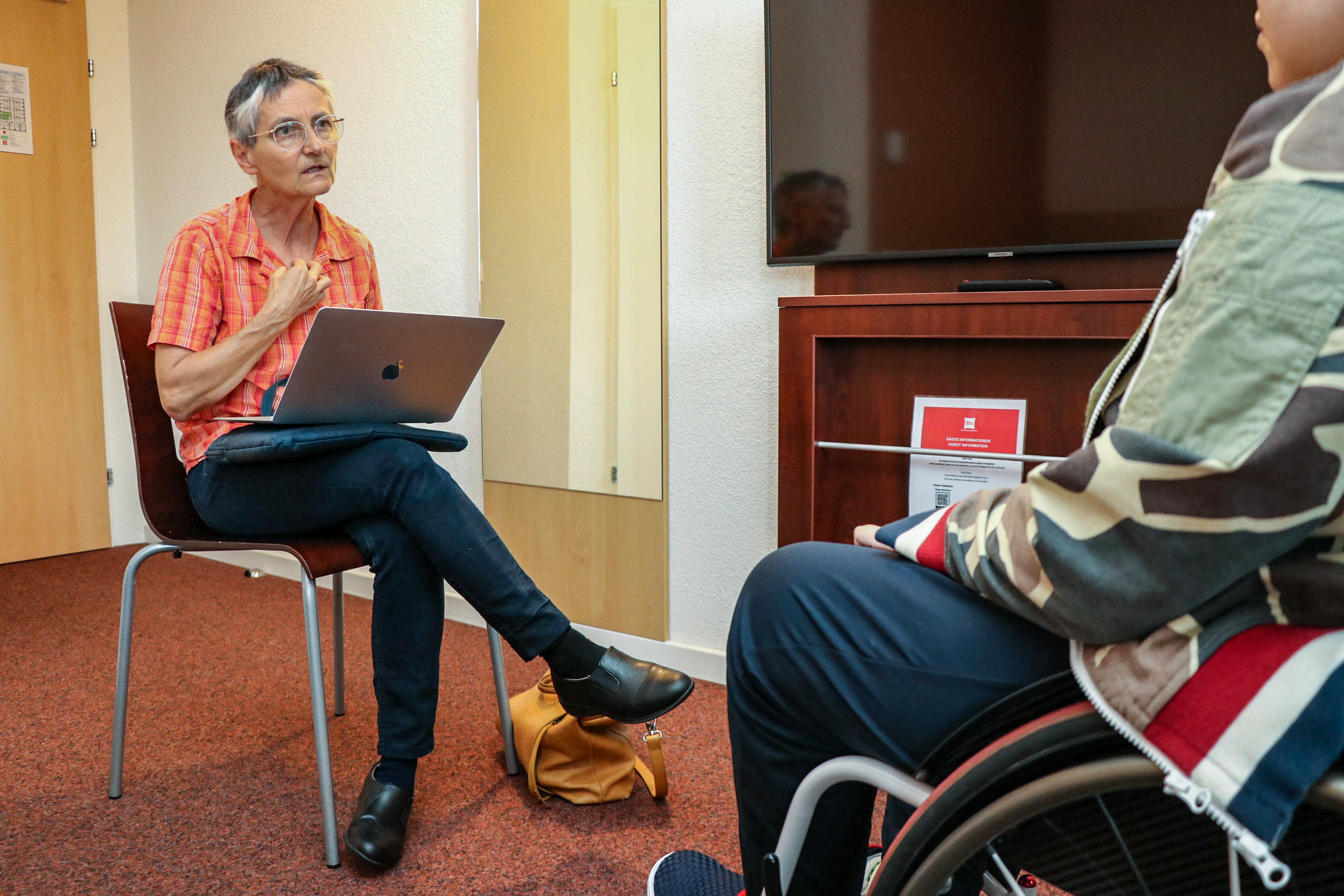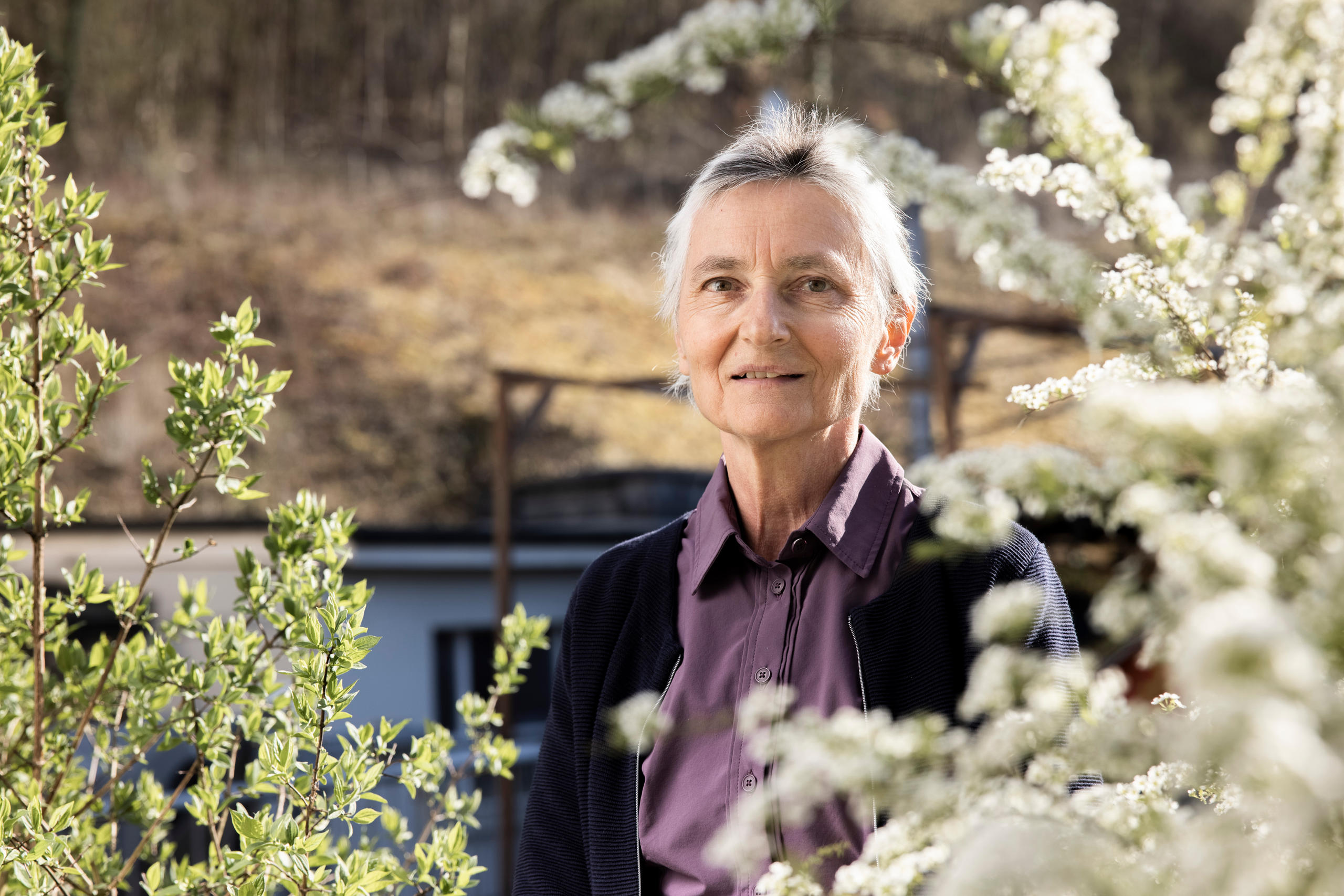
Finding life in the face of death: A Japanese woman’s emotional journey

Aina, a Japanese woman, has suffered from a rare neurological disorder since childhood. She came to Basel to die. The journey made her question her motivation and reasons to continue living.
Aina sucks the liquid from a glass through a straw. Her father squeezes her hand. His eyes are red. He forces himself not to look away.
Just one drop. The bitterness spreads across Aina’s tongue.
Then the faces of her parents and two sisters flash up. Her dog. Scenes full of life. Her mind crowds with images of the people who have always given her unconditional love and protected her. She can’t swallow the liquid meant to bring her to her death.
Tears run down her cheeks. She begins to breathe fast. She coughs.
The medicine, pentoarbital, needs to be swallowed in one gulp. If not, only a small consumption can lead to being in a coma. “What’s wrong, Aina?” asks Erika Preisig, the doctor accompanying her. Aina sobs. “I can’t stop thinking about my family.”
No success
Aina lives with her parents in the Kyushu region of southern Japan. Age six she was diagnosed with a rare neurological disorder after her parents noticed she lacked motricity. She is completely dependent on her mother. From the thigh down, her legs no longer obey her, and she cannot move her arms from the elbow down, with the exception of her right wrist. She can’t stand or walk.

Aina is 30 years old. Up until the age of 14, she tried all kinds of treatments and spent most of her twenties in hospital. All the treatments were ineffective. Her doctor told her there was no hope of a cure.
Aina’s illness is not life-threatening as long as she takes her medicine. The drugs make sure the disease stays at bay. That is what makes it so painful for her. Unlike the late phases of cancer, there is no end. Her illness is not going anywhere, it is just there to stay.
Five years ago came the idea of assisted suicide. The thought never left her. But her condition means she is physically incapable of it. In Japan, where assisted dying is banned, anyone who helps a person to commit suicide is criminally liable.
In September 2019, Aina submitted a request to the Swiss assisted suicide organisation Lifecircle. A month later, she received the go-ahead from the organisation.
Her illness has “disrupted my parents’ lives,” she says, almost with shame. Her mother has had to care for her own parents – and for her. Her father, who worked as a helicopter pilot, retired age 53, which is not unusual for pilots. But in order to cover the high costs of medical care, he looked for another job. He worked until he was 67.
“Without me, my mother and father would have led different lives. They would have travelled and enjoyed their hobbies without a financial burden.”
When she told her family in February 2019 that she wanted to die via assisted suicide, they were against it. Her parents couldn’t bear the thought of losing her. They begged her to reconsider.
But Aina made an appointment in Basel. The assisted suicide was supposed to happen in March 2020. But because of the coronavirus pandemic, she had to postpone the date several times. Her parents didn’t budge. They remained opposed to it.
In the six months before her journey to Basel, both sisters travelled from the neighbouring province every weekend to see her at home. They wanted to spend as much time as possible with her.

“I don’t want to follow my own desires and put myself before the family who cares so much for me,” she says. Her wish to die remained unchanged, but Aina could feel that she was also yielding to the wishes of others.
In the summer, travel restrictions were loosened. Finally, her parents said: “We cannot insist that you live for us. We don’t condone this, but we are also not against it.”
The date for the assisted suicide was set for September 2.
Her mother stayed in Japan and cried when she left with her father. Her mother cried. She didn’t want to watch her own daughter die.

More
‘I don’t want to kill anybody’
Am I selfish?
August 31. Aina arrived in Basel. Erika Preisig, the doctor, came to the hotel and asked Aina a list of questions about the history of her illness and why she wanted assisted suicide.
The talk lasted 40 minutes. Preisig said: “Given the history of your illness and your psychological condition, there is no reason to reject your application for assisted suicide.”
Aina was relieved. She was to take take a fatal dose of medicine two days later at the Lifecircle premises. That was it, she thought.
But she noticed that her father, who slept with her in the room, was quietly and secretly crying. In the middle of the night he began to shake. She held his hand.
“Am I selfish to want to die? Or are they selfish if they don’t let me die?”
The night before the appointment, Aina barely slept. His fear of her death filled the simple hotel room with unrest.

‘You aren’t ready for this yet’
The next morning, Aina and her father waited for a taxi at a coffee table in the hotel lobby. The stress was visible in her father’s face.
When they arrived at the Lifecircle facility in Basel, Aina sat down at a table with Preisig. “Are you ready for this?” Preisig asked.
“I am not yet sure,” she answered.
The doctor suddenly looked worried. “Is it because of your parents? If you are not sure if you want to die for your own sake, then you shouldn’t do it.”
Tears flowed from Aina’s eyes. “If it was just about me, then I would definitely die. But I can’t stop thinking about my parents.”
Preisig turned to Aina’s father and asked him the same question. He said: “If she wants to die then I must respect that.”
The discussion lasted about 20 minutes. Then Aina broke it off. “I will die, I will do it.” She climbed onto the couch with her father’s help.
Her father sat next to her. He took his daughter’s hand and smiled weakly. “I respect your decision.” He thanked her for living with him.
A video recording began. Name, date of birth and reason for death. Aina holds back her tears and answers all the questions, one after the other, to the camera.
Preisig handed Aina a glass with a fatal dose of pentobarbital. She had waited five years for this moment, and now it was here.
She sips at the straw, but the liquid doesn’t rise to her mouth.
“You should go home to your family,” Erika Preisig says. “You aren’t ready for this yet.”
“Really?” Aina asks in a weepy voice. Preisig answers calmly. “You don’t want to do this to your parents. Fate is telling you that you should live a bit longer.” Aina says “Okay.” Her father hugs her.
He will take her back home.
“I am sure the day will come when I regret not dying today,” she says.
More

In compliance with the JTI standards
More: SWI swissinfo.ch certified by the Journalism Trust Initiative



























You can find an overview of ongoing debates with our journalists here . Please join us!
If you want to start a conversation about a topic raised in this article or want to report factual errors, email us at english@swissinfo.ch.